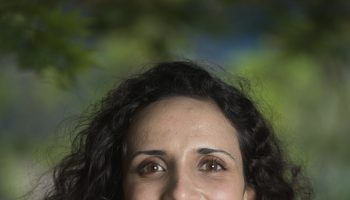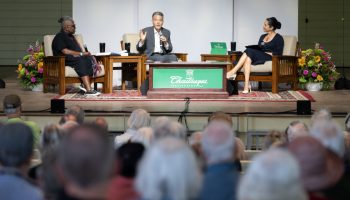
Von Smith
Staff writer
One year ago today, Radio Free Europe/Radio Liberty journalist and editor Alsu Kurmasheva was released from Russian detainment in a landmark prisoner swap deal alongside Wall Street Journal reporter Evan Gershkovich and former U.S. Marine Paul Whelan.
“Almost all of the authoritarian leaders are using the same playbook, as if it was written just step by step,” Kurmasheva said. “I’m looking forward to talking about my personal experience as an example of the authoritarian machine that Chautauquans have heard about this week.”
Kurmasheva joins Wall Street Journal publisher and CEO of Dow Jones Almar Latour and U.S. hostage negotiator Roger D. Carstens to discuss the “anatomy of a prisoner drama” to close the Week Six Chautauqua Lecture Series theme “The Global Rise of Authoritarianism” at 10:45 a.m. today in the Amphitheater.
Latour began as a news assistant before becoming a staff reporter in London, Stockholm, Brussels and New York for WSJ before working his way to publisher. His role as a publisher and Dow Jones CEO placed him in the middle of the fight to free Gershkovich along with Kurmasheva and challenged his newsroom to rally around their release.
“In this particular case, there was tremendous solidarity across the news industry,” Latour said. “We keep (Gershkovich and Kurmsheva) in the spotlight so that policymakers but also citizens and readers around the world can be aware of what is going on.”
Carstens served as special presidential envoy for hostage affairs under the Trump and Biden administrations and oversaw negotiations for the release of Americans like NBA star Brittney Griner in 2022.
“I would say that a lot of the countries that have opposed the United States and our allies were countries that had more of an authoritarian bent,” Carstens said.
Carstens began his career at the United States Military Academy West Point at the tail end of the Cold War.
“I kind of grew up watching authoritarian governments as opponents of the United States of America and democracy and freedom,” he said.
Kurmasheva recounted being detained as she traveled to care for her ill mother in October 2023, not expecting to be targeted outside of work.
“No moment is certain until you touch the ground,” Kurmasheva said. “I didn’t allow myself to hope in prison. Hope can be dangerous when there is no strategy.”
While detained, Kurmesheva’s American and Russian passports were confiscated, blocking her from leaving the country. She was then placed on trial and quickly convicted of “spreading false information” with a sentence of six-and-a-half years in Russian prison.
On Aug. 1 of last year, Kurmasheva was released in a prisoner swap deal led by Carstens.
Carstens wasn’t surprised that the United States was deeply concerned about the imprisonment of journalists.
“Jounalism is not a crime, he said. You should be able to report boldly, bravely and pursue the truth and not be thrown in jail for doing your job.”
Carstens’ viewpoints align with Kurmasheva’s concept of the “authoritarian playbook.”
“We used to say it tongue in cheek, but it’s true that there’s a dictator’s playbook, and when you take a look at who’s being jailed in a lot of these authoritarian countries, they’re going straight for the reporters, straight for the human rights defenders,” Carstens said.
However, Carstens sees reason to be optimistic. Despite attempts by Russian President Vladimir Putin to jail journalists, Carstens and Latour notice the strong journalistic presence that has persevered.
“He’s trying to encourage a chilling effect so that other journalists are afraid to do their jobs, but the great thing is, he’s not succeeding,” Carstens said. “Every day, journalists are out there with great courage doing their job and pursuing the truth.”
Despite public perception of the state of American democracy, Kurmasheva is confident in the future of the United States.
“What I see is a very strong civil society,” Kurmasheva said. “(I see) a belief in the power of elections. I see legal institutions and the power of education. Everything I mentioned right now does not exist in authoritarian countries.”
Kurmasheva looks forward to bringing her personal experience alongside Carstens’ technical perspective on negotiating and Latour’s perspective on the power of advocacy this morning in the Amp.




